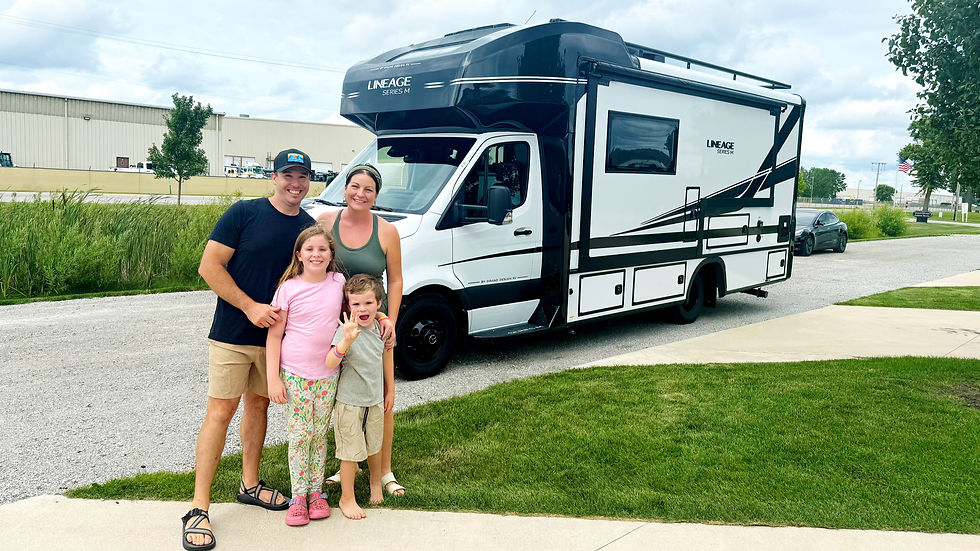When Marissa and I go back to Tennessee, her accent becomes thicker within days.
“Boil” becomes “Bull”
“Oil” becomes “Oeyoll”
And “well” becomes “whale”
If any of those words collide in one sentence, prepare to be COMPLETELY confused.
But it proves something important:
Your environment changes you faster than you think.
Most of us spend almost all year in the same environment — same routines, same people, same scenery. We don’t realize how much that shapes who we are until we leave it.
To think, live, and feel differently, you have to step out of the environment that built your habits.
A weekend trip won’t do it. Even a one-week vacation barely scratches the surface.
It wasn’t until we’d been RVing for two or three weeks straight that something shifted — a deep reset I didn’t know I needed.
That’s the power of SLOW RV travel: it doesn’t just change your view; it changes you.

SLOW RV Travel…
1. Sends You Outside
Before RVing extended periods of time, vacations rarely involved being outside. And when we only had a weekend, this was the breakdown:25% traveling to and from the location25% figuring out the plan25% arguing about the plan
25% actually doing the thing
Bonus: 2-3 days recovering from “vacation”Slow, longer term travel works differently. Marissa and I go on walks. The kids explore outside.
We didn’t know it, but we now LOVE hiking. RVing changed our relationship with the outdoors — and the outdoors changed us.
2. Leverages Who (and What) Matters Most
When we had a basement, we filled it — not because we needed more, but because we could.
In an RV, every item has to earn its place.
If something comes in, something else goes out.
Before buying, we ask:
Do I love this? Does it make life better?
That tiny question doesn’t stay in the closet.
It creeps into everything — your habits, your schedule, your priorities.
Weekend RV trips never push you that far — you can tolerate clutter for 48 hours.
But live in a small space for 3+ weeks, and the truth shows up fast:
What you carry, physically or mentally, either helps you or drains you.
Let go of what doesn’t matter, and something opens up:
You finally have space to invest in the people who do.
Less clutter → more clarity.
Less noise → more connection.
Less pressure → more presence.
That’s the gift of SLOW RV travel — it strips away the extra so you can see who’s right in front of you.
3. Orients You to the Present
Before RV life, our schedules were jam-packed. We were home, but rarely there.Conversations were more like pleasantries.
This sums up 95% of our evening conversations after an exhausted day:Me: “How was your day?”Marissa: “Great”Me: “Cool”Then we’d grab the remote, veg out for two hours, and repeat the next day.
Long-term RVing breaks that cycle.Every morning now, Marissa and I sit down with coffee and actually talk.
We take long walks.
We sit around campfires for hours with friends.
Those things DID NOT happen in a house.
RVing puts boundaries around your attention. The kind that pull you back into the moment and back to the people right next to you.
Boredom gets a bad reputation, but it’s where reflection and creativity live.
RVing helped me trade constant busyness for real presence — and it’s one of the best trades I’ve ever made.
4. Weakens Pressure to Keep Up with the Joneses
I’ve sat around campfires with millionaires and thousandaires.
The good news when you RV slow?
No one cares.
Around a fire, nobody’s trying to impress you.
No one’s asking what you drive, what you make, or what you own.
You could have a fleet of rental planes, run a pet food company, or guide millionaires up Mount Everest (okay… that one might get a story).
But even then — it’s not a competition.
Slow RVing draws you toward people who are more interested in who you are than what you have.
It shifts the focus away from money, status, and the rat race —
and toward the things that actually matter when the world gets quiet.
So What About You?
Could you block three weeks on your calendar — today?
Don’t plan the route. Don’t overthink the details.
Just pick the dates and protect them.
And if three weeks feels like too much, start smaller.
A week. A weekend. Even a day.
Take the step you can take today — the road will meet you there.
Until next time, see you down the road!
- Nathan





